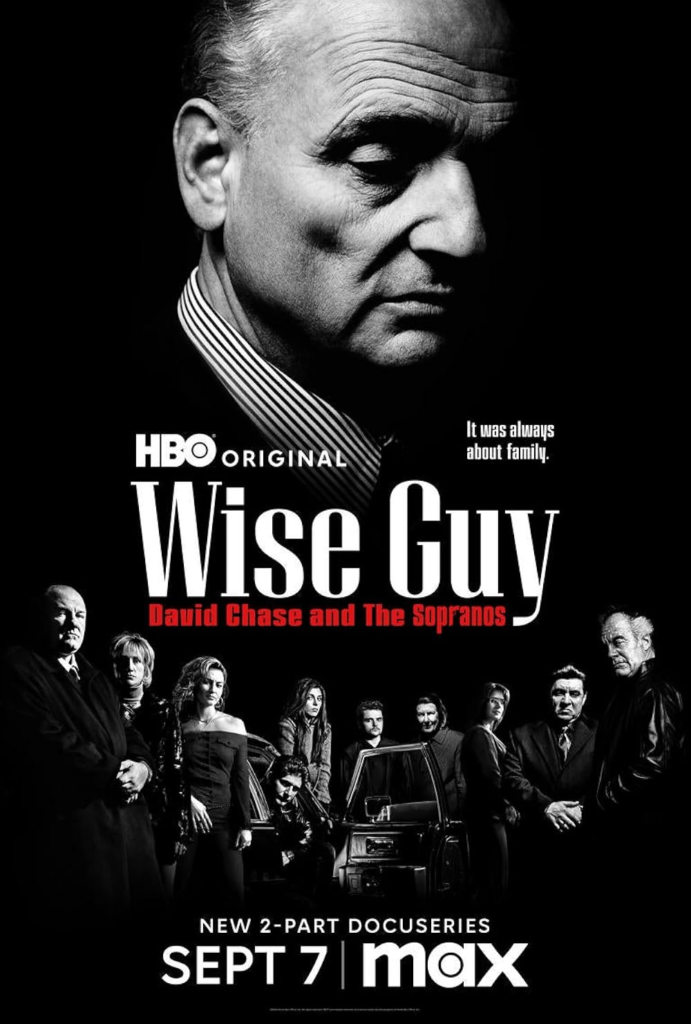Wise Guy: David Chase and The Sopranos Christian Review

When we think of television that reshaped storytelling, The Sopranos is one show that gets tossed around frequently. It’s the kind of series that doesn’t just tell a story but immerses you in a world so dark, complex, and unapologetically raw that it forces you to rethink the way television works. For many, The Sopranos isn’t just a show—it’s a spiritual epic. But what does that mean from a Christian point of view? Is it the kind of spirituality that leads you toward reflection, repentance, and redemption? Or is it more like staring into a moral abyss, leaving you with questions, discomfort, and, at times, outright tension? That’s what Wise Guy: David Chase and The Sopranos explores.
At first glance, Wise Guy is a behind-the-scenes documentary about the creation of The Sopranos, focusing on the man who made it all happen: David Chase. You see the outtakes, the audition tapes, the storytelling process—it’s like a masterclass in television creation. But the question that hangs over it, particularly for Christians, is what it’s really saying about the show’s complex, morally ambiguous world. Does it celebrate that ambiguity or critique it? The lines blur, and therein lies the challenge of engaging with this content from a faith perspective.
Can a Story Be “Spiritual” Without Redemption?
One of the claims that might jump out to a Christian viewer is the idea that The Sopranos is a “spiritual epic.” That’s a term that, within Christian circles, usually brings to mind narratives of good versus evil, sin, and grace—stories that point toward redemption. But The Sopranos doesn’t follow that trajectory. Tony Soprano, the mob boss at the center of it all, is a man who constantly wrestles with his conscience but never seems to find the way out. He’s plagued by guilt, anxiety, and a deep-seated knowledge that his life is riddled with wrong choices. Yet he persists. And while that’s fascinating from a psychological standpoint, it also highlights the absence of a crucial element: repentance.
For Christians, repentance is the key to moving past guilt. It’s not just about feeling bad for what you’ve done; it’s about turning away from it. In The Sopranos, we see Tony wrestling with his demons, but we never see him truly repent. He’s constantly pulled between his violent lifestyle and his longing for something more meaningful, but he never fully breaks free. Watching Wise Guy, you get the sense that David Chase, brilliant as he is, never intended for Tony to find redemption. Instead, the show lingers in the gray areas, where moral clarity is blurred, and the consequences of sin feel inevitable yet somehow unresolved.
That can be both compelling and unsettling. As Christians, we’re used to stories where wrongs are righted and justice is served, whether in this life or the next. The Sopranos doesn’t offer that kind of resolution. And that leaves the viewer—especially one who holds onto the hope of redemption—with a sense of moral tension that’s hard to shake.
The Genius of David Chase and the Christian Dilemma
David Chase, as Wise Guy makes clear, is nothing short of a genius when it comes to crafting characters and stories that feel real. He’s a master at capturing the nuances of human behavior, especially the darker sides that most people prefer to keep hidden. This documentary gives us a deep dive into his creative process, and for anyone interested in the art of storytelling, it’s mesmerizing.
But as Christians, we’re also called to be discerning about the stories we consume. While Chase’s work is undeniably brilliant, it raises a difficult question: Can we appreciate the artistry without absorbing the moral ambiguity that comes with it? In The Sopranos, characters like Tony are both likable and despicable. They’re charming in their brokenness, and that’s part of what makes the show so compelling. But there’s also a danger in that. The Bible warns us to guard our hearts (Proverbs 4:23), and it’s easy to see how a show like this could subtly shape our understanding of morality, making us more comfortable with sin because we’ve spent so much time in the company of morally compromised characters.
Chase himself, as Wise Guy portrays him, is reluctant to offer easy answers. He doesn’t moralize; he doesn’t preach. He just tells the story. That’s what makes him such a compelling storyteller, but it’s also what makes his work potentially troubling for Christian viewers. Without a clear moral framework, we’re left to interpret these characters’ lives on our own terms. And while that can lead to deep reflection, it can also leave us adrift, unsure of what the story is ultimately trying to say about good and evil.
Violence, Morality, and Desensitization
Watching Wise Guy, you’re reminded just how violent The Sopranos was. The documentary doesn’t shy away from showing the brutal moments that made the series famous. And while the violence was often used to underscore the realities of life in the mob, it also raises important questions about how much violence we should expose ourselves to as Christians.
The Bible doesn’t condemn all depictions of violence—after all, there’s plenty of it in Scripture, particularly in the Old Testament. But there’s a difference between violence that serves a purpose in the story of redemption and violence that’s portrayed for entertainment. In The Sopranos, and by extension Wise Guy, the violence is often part of the show’s commentary on the destructiveness of mob life. But does seeing so much of it desensitize us? Does it make us more comfortable with the idea that violence is just a part of life, rather than something to be mourned and avoided?
Romans 12:2 tells us not to conform to the pattern of this world but to be transformed by the renewing of our minds. It’s a reminder that we need to be careful about what we allow to shape our thinking. While Wise Guy is a fascinating exploration of The Sopranos, it’s also a reminder that the show itself was steeped in a world of violence and sin. As Christians, we need to be mindful of how much of that we’re willing to take in, even in the name of appreciating great art.
The Creative Process: A Double-Edged Sword
One of the most intriguing aspects of Wise Guy is its focus on the creative process. You get a sense of just how much thought and effort went into making The Sopranos the cultural phenomenon it became. The audition tapes, the outtakes, the interviews—it’s all fascinating, especially for anyone who’s a fan of the series or interested in television production.
But here’s the thing: the creative process, as Wise Guy shows it, is also a reminder of the power that storytellers have. David Chase had the ability to shape the way millions of people viewed life, morality, and justice. That’s not something to take lightly. As Christians, we’re called to be “salt and light” in the world (Matthew 5:13-16), which means that we, too, have a responsibility to influence the culture around us in ways that point to truth and righteousness.
Watching Wise Guy, you can’t help but admire Chase’s skill. But you also can’t help but wonder: What if this immense creative power had been used to tell a story of redemption? What if Tony’s struggle with his conscience had led him toward repentance, rather than deeper into sin? It’s a question that Wise Guy doesn’t answer, but one that Christian viewers might find themselves pondering long after the documentary is over.
Final Thoughts: A Complex Viewing Experience
In the end, Wise Guy: David Chase and The Sopranos is a well-made documentary that offers plenty to think about, especially for fans of the series. But for Christian viewers, it’s a more complicated experience. On the one hand, you can appreciate the artistry and the insight into the creative process. On the other hand, the subject matter itself—the moral ambiguity, the violence, the lack of redemption—raises questions about how much we should engage with this kind of content.
Wise Guy doesn’t give you easy answers. It doesn’t try to. But that’s part of what makes it so compelling. It forces you to wrestle with the tension between appreciating great art and staying true to your faith. And maybe that’s a good thing. After all, our faith isn’t meant to be comfortable all the time. Sometimes, it’s in wrestling with these questions that we grow the most.
Rating: 6/10


